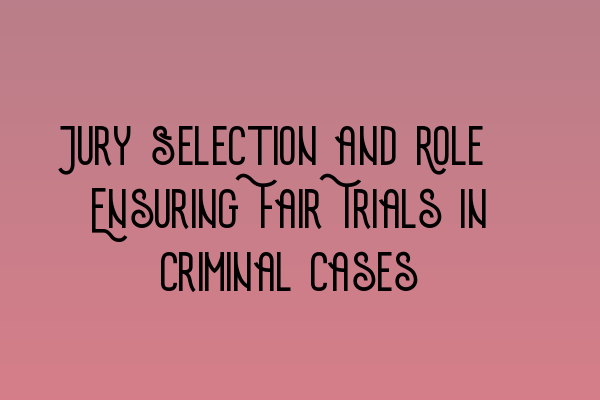Jury Selection and Role: Ensuring Fair Trials in Criminal Cases
In criminal cases, one essential aspect of the legal process is the selection of a jury. A fair and impartial jury is crucial for upholding the principles of justice and ensuring that defendants receive a fair trial. This blog post will discuss the importance of jury selection, explore the role of jurors in criminal cases, and highlight the measures taken to ensure fair trials.
The Importance of Jury Selection
Jury selection plays a significant role in the criminal justice system. The fundamental principle is to select a diverse group of individuals who will impartially assess the evidence presented during a trial. The selection process aims to prevent bias and ensure a fair trial for the defendant.
During jury selection, both the prosecution and defense have the opportunity to question potential jurors to determine if they have any biases or prejudices that could impact their ability to render a fair verdict. This process is commonly known as voir dire.
Lawyers rely on their skills and strategies to select jurors who are likely to be fair, unbiased, and capable of reaching a verdict based solely on the evidence presented in court. It is essential to identify potential jurors who may have preconceived notions or biases that could influence their judgment.
Ensuring diversity within the jury is also crucial. A diverse jury can provide different perspectives and experiences, enhancing the overall fairness of the trial. It is a means of protecting defendants from unfair judgments based on discriminatory practices.
With the advent of digital platforms and social media, jury selection has become more challenging. Attorneys and jury consultants now conduct thorough online research to gather information about potential jurors. This allows them to assess potential biases or connections that may impact their ability to make impartial decisions.
The Role of Jurors in Criminal Cases
Jurors play a vital role in criminal cases. Their responsibility is to determine the guilt or innocence of the defendant based on the evidence presented during the trial. They must assess the credibility of witnesses, evaluate the strength of the prosecution’s case, and decide whether the prosecution has proven its case beyond a reasonable doubt.
Jurors must approach the trial with an open mind and remain impartial throughout the proceedings. They must set aside any personal biases, opinions, or external influences and focus solely on the evidence presented in court. Their role is to act as independent fact-finders and apply the law as instructed by the judge.
It is important to note that jurors are not legal experts. They represent the collective judgment of ordinary citizens who bring their life experiences and common sense to the deliberation process. This diversity of perspectives ensures a fair and balanced consideration of the evidence.
Ensuring Fair Trials
To ensure fair trials, various measures are taken throughout the jury selection process and the trial itself. These measures include:
- Thorough jury selection process: The voir dire process allows both the prosecution and defense to identify potential biases or prejudices among potential jurors.
- Judge’s instructions: The judge provides jurors with clear instructions on their role, the burden of proof, and the legal principles relevant to the case.
- Exclusion of prejudiced jurors: If a potential juror displays significant bias or prejudice, they can be excluded from serving on the jury.
- Challenge for cause: Attorneys can challenge potential jurors if they believe there is a legal reason to do so, such as a conflict of interest or bias.
- Peremptory challenges: Attorneys may also have a limited number of peremptory challenges, allowing them to remove potential jurors without providing a specific reason.
- Jury deliberation: During deliberation, jurors are encouraged to discuss the evidence, consider differing opinions, and come to a unanimous verdict.
These measures collectively aim to safeguard the integrity of the criminal justice system and ensure that defendants receive a fair trial.
At SQE Criminal Law & Practice Law UK, we understand the importance of fair trials and the role of jury selection. If you are preparing for the SQE 1 or SQE 2 exams, be sure to check out our SQE 1 Practice Exam Questions and SQE 1 Practice Mocks FLK1 FLK2 articles. We also offer comprehensive SQE 2 Preparation Courses and SQE 1 Preparation Courses to help you succeed in your legal career. Stay up to date with the latest SRA SQE exam dates by visiting our SRA SQE Exam Dates page.
In conclusion, jury selection and the role of jurors are vital components of ensuring fair trials in criminal cases. The diverse perspectives and experiences of jurors, coupled with the measures taken to prevent bias, contribute to the fair administration of justice. Understanding the significance of jury selection is crucial for both legal professionals and individuals involved in the legal process.
